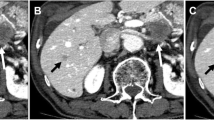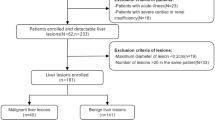Abstract
Purpose
To evaluate the usefulness of the deep learning image reconstruction (DLIR) to enhance the image quality of abdominal CT, compared to iterative reconstruction technique.
Method
Pre and post-contrast abdominal CT images in 50 patients were reconstructed with 2 different algorithms: hybrid iterative reconstruction (hybrid IR: ASiR-V 50%) and DLIR (TrueFidelity). Standard deviation of attenuation in normal liver parenchyma was measured as the image noise on pre and post-contrast CT. The contrast-to-noise ratio (CNR) for the aorta, and the signal-to-noise ratio (SNR) of the liver were calculated on post-contrast CT. The overall image quality was graded on a 5-point scale ranging from 1 (poor) to 5 (excellent).
Results
The image noise was significantly decreased by DLIR compared to hybrid-IR [hybrid IR, median 8.3 Hounsfield unit (HU) (interquartile range (IQR) 7.6–9.2 HU); DLIR, median 5.2 HU (IQR 4.6–5.8), P < 0.0001 for post-contrast CT]. The CNR and SNR were significantly improved by DLIR [CNR, median 4.5 (IQR 3.8–5.6) vs 7.3 (IQR 6.2–8.8), P < 0.0001; SNR, median 9.4 (IQR 8.3–10.1) vs 15.0 (IQR 13.2–16.4), P < 0.0001]. The overall image quality score was also higher for DLIR compared to hybrid-IR (hybrid IR 3.1 ± 0.6 vs DLIR 4.6 ± 0.5, P < 0.0001 for post-contrast CT).
Conclusions
Image noise, overall image quality, CNR and SNR for abdominal CT images are improved with DLIR compared to hybrid IR.



Similar content being viewed by others
References
Shuman WP, Chan KT, Busey JM, Mitsumori LM, Choi E, Koprowicz KM, Kanal KM. Standard and reduced radiation dose liver CT images: adaptive statistical iterative reconstruction versus model-based iterative reconstruction-comparison of findings and image quality. Radiology. 2014;273(3):793–800.
Kataria B, Althen JN, Smedby O, Persson A, Sokjer H, Sandborg M. Assessment of image quality in abdominal CT: potential dose reduction with model-based iterative reconstruction. Eur Radiol. 2018;28(6):2464–73.
Ichikawa Y, Kitagawa K, Nagasawa N, Murashima S, Sakuma H. CT of the chest with model-based, fully iterative reconstruction: comparison with adaptive statistical iterative reconstruction. BMC Med Imaging. 2013;13:27.
Deak Z, Grimm JM, Treitl M, Geyer LL, Linsenmaier U, Korner M, Reiser MF, Wirth S. Filtered back projection, adaptive statistical iterative reconstruction, and a model-based iterative reconstruction in abdominal CT: an experimental clinical study. Radiology. 2013;266(1):197–206.
Mitsumori LM, Shuman WP, Busey JM, Kolokythas O, Koprowicz KM. Adaptive statistical iterative reconstruction versus filtered back projection in the same patient: 64 channel liver CT image quality and patient radiation dose. Eur Radiol. 2012;22(1):138–43.
Singh S, Kalra MK, Hsieh J, Licato PE, Do S, Pien HH, Blake MA. Abdominal CT: comparison of adaptive statistical iterative and filtered back projection reconstruction techniques. Radiology. 2010;257(2):373–83.
Silva AC, Lawder HJ, Hara A, Kujak J, Pavlicek W. Innovations in CT dose reduction strategy: application of the adaptive statistical iterative reconstruction algorithm. AJR Am J Roentgenol. 2010;194(1):191–9.
Khawaja RD, Singh S, Otrakji A, Padole A, Lim R, Nimkin K, Westra S, Kalra MK, Gee MS. Dose reduction in pediatric abdominal CT: use of iterative reconstruction techniques across different CT platforms. Pediatr Radiol. 2015;45(7):1046–55.
Willemink MJ, Noël PB. The evolution of image reconstruction for CT-from filtered back projection to artificial intelligence. Eur Radiol. 2019;29(5):2185–95.
Kwon H, Cho J, Oh J, Kim D, Cho J, Kim S, Lee S, Lee J. The adaptive statistical iterative reconstruction-V technique for radiation dose reduction in abdominal CT: comparison with the adaptive statistical iterative reconstruction technique. Br J Radiol. 2015;88(1054):20150463.
Pickhardt PJ, Lubner MG, Kim DH, Tang J, Ruma JA, del Rio AM, Chen GH. Abdominal CT with model-based iterative reconstruction (MBIR): initial results of a prospective trial comparing ultralow-dose with standard-dose imaging. AJR Am J Roentgenol. 2012;199(6):1266–74.
Ehman EC, Yu L, Manduca A, Hara AK, Shiung MM, Jondal D, Lake DS, Paden RG, Blezek DJ, Bruesewitz MR, et al. Methods for clinical evaluation of noise reduction techniques in abdominopelvic CT. Radiographics. 2014;34(4):849–62.
Jensen CT, Wagner-Bartak NA, Vu LN, Liu X, Raval B, Martinez D, Wei W, Cheng Y, Samei E, Gupta S. Detection of colorectal hepatic metastases is superior at standard radiation dose CT versus reduced dose CT. Radiology. 2019;290(2):400–9.
Akagi M, Nakamura Y, Higaki T, Narita K, Honda Y, Zhou J, Yu Z, Akino N, Awai K (2019) Deep learning reconstruction improves image quality of abdominal ultra-high-resolution CT. Eur Radiol.
Jiang Hsieh EL, Brian Nett, Jie Tang, Jean-Baptiste Thibault, Sonia Sahney (2019) A new era of image reconstruction: TrueFidelity™-Technical white paper on deep learning image reconstruction. https://wwwgehealthcare.com/-/jssmedia/040dd213fa89463287155151fdb01922pdf.
Jensen CT, Liu X, Tamm EP, Chandler AG, Sun J, Morani AC, Javadi S, Wagner-Bartak NA. Image quality assessment of abdominal CT by use of new deep learning image reconstruction: initial experience. AJR American J Roentgenol. 2020;21:1–8.
Tatsugami F, Higaki T, Nakamura Y, Yu Z, Zhou J, Lu Y, Fujioka C, Kitagawa T, Kihara Y, Iida M, et al. Deep learning-based image restoration algorithm for coronary CT angiography. Eur Radiol. 2019;29(10):5322–9.
Christner JA, Braun NN, Jacobsen MC, Carter RE, Kofler JM, McCollough CH. Size-specific dose estimates for adult patients at CT of the torso. Radiology. 2012;265(3):841–7.
Brady SL, Kaufman RA. Investigation of American Association of Physicists in Medicine Report 204 size-specific dose estimates for pediatric CT implementation. Radiology. 2012;265(3):832–40.
The measurement, reporting, and management of radiation dose in CT: report of AAPM Task Group 23 of the Diagnostic Imaging Council CT Committee. AAPM report no. 96. College Park (MD): American Association of Physicists in Medicine.
J-RIME JNfRaIoME: National diagnostic reference levels in Japan (2020)—Japan DRLs 2020. http://www.radherjp/J-RIME/report/DRL2020_Engverpdf 2020.
Racine D, Becce F, Viry A, Monnin P, Thomsen B, Verdun FR, Rotzinger DC. Task-based characterization of a deep learning image reconstruction and comparison with filtered back-projection and a partial model-based iterative reconstruction in abdominal CT: A phantom study. Phys Med. 2020;76:28–37.
Solomon J, Lyu P, Marin D, Samei E: Noise and spatial resolution properties of a commercially available deep learning-based CT reconstruction algorithm. Med Phys 2020.
Greffier J, Hamard A, Pereira F, Barrau C, Pasquier H, Beregi JP, Frandon J. Image quality and dose reduction opportunity of deep learning image reconstruction algorithm for CT: a phantom study. Eur Radiol. 2020;30(7):3951–9.
Benz DC, Benetos G, Rampidis G, von Felten E, Bakula A, Sustar A, Kudura K, Messerli M, Fuchs TA, Gebhard C et al. (2020) Validation of deep-learning image reconstruction for coronary computed tomography angiography: Impact on noise, image quality and diagnostic accuracy. J Cardiovasc Comput Tomogr.
Kim I, Kang H, Yoon HJ, Chung BM, Shin NY (2020) Deep learning-based image reconstruction for brain CT: improved image quality compared with adaptive statistical iterative reconstruction-Veo (ASIR-V). Neuroradiology.
Park C, Choo KS, Jung Y, Jeong HS, Hwang JY, Yun MS (2020) CT iterative vs deep learning reconstruction: comparison of noise and sharpness. Eur Radiol.
Pooler BD, Lubner MG, Kim DH, Chen OT, Li K, Chen GH, Pickhardt PJ. Prospective evaluation of reduced dose computed tomography for the detection of low-contrast liver lesions: direct comparison with concurrent standard dose imaging. Eur Radiol. 2017;27(5):2055–66.
Mileto A, Guimaraes LS, McCollough CH, Fletcher JG, Yu L. State of the art in abdominal CT: the limits of iterative reconstruction algorithms. Radiology. 2019;293(3):491–503.
Author information
Authors and Affiliations
Corresponding author
Ethics declarations
Conflict of interest
The authors declare that they have no conflict of interest.
Ethical approval
This study was approved by the local institutional review board at Mie University Hospital (approval No. H2019-207).
Informed consent
Written informed consent was waived since this study used existing clinical CT image data. The opportunity to opt-out of the inclusion to this study was given through a notice in the hospital website. No patient showed intention for an exclusion from this study.
Additional information
Publisher's Note
Springer Nature remains neutral with regard to jurisdictional claims in published maps and institutional affiliations.
About this article
Cite this article
Ichikawa, Y., Kanii, Y., Yamazaki, A. et al. Deep learning image reconstruction for improvement of image quality of abdominal computed tomography: comparison with hybrid iterative reconstruction. Jpn J Radiol 39, 598–604 (2021). https://doi.org/10.1007/s11604-021-01089-6
Received:
Accepted:
Published:
Issue Date:
DOI: https://doi.org/10.1007/s11604-021-01089-6




